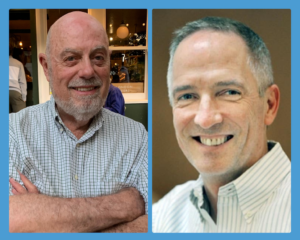Rapid advancements in science and technology may be changing healthcare delivery, but the heart of medicine continues to be the relationship between doctor and patient.

When David Howell, PhD (’78), a medical writer for peer-reviewed journals in San Francisco, moved back to North Carolina in late 2020, he needed to find an infectious disease specialist to follow his chronic disease. But physician shortages exacerbated by the COVID-19 pandemic complicated his search. He knew people who were established patients of Dr. Joe Eron, Chief of the UNC Division of Infectious Diseases. He wondered if he might accept a new patient.
“I remember writing Dr. Eron a rather formal note to introduce myself, expressing that I would appreciate if he had an opening that wouldn’t take away from his existing patients. He immediately responded.”
“When I met him in January, it was as if he had cancelled everything on his schedule for the day. It was just a wonderful way to start talking about my particular situation and what he did for that.”
The sacred nature of the physician-patient relationship can significantly shape health outcomes, and this includes trusting that a physician is working in a patient’s best interest. Howell says Dr. Eron’s way of being is centered around compassion, goodwill and rigorous science.
“He’s just so humble and caring. I’m grateful to him on many counts.”
Last summer, Howell booked a trip to Europe but the planning came to a halt when his sodium levels were low. Dr. Eron cautioned him against long distance travel if the levels didn’t return to where they needed to be. He ordered new blood tests on a Thursday before the Tuesday that David was scheduled to travel. Then, on Monday at 6:30 pm, David got a call with the results.
“He said, ‘I know you’re scheduled to fly out tomorrow.’ And then he said, ‘Well, go!’ And from there, I started frantically packing because I’m superstitious, and the demoralizing unpacking of a suitcase outweighs the freneticism I’m willing to pay to get the job done at the last minute.”
After Europe and Dr. Eron’s own vacation, David had a follow up in October 2021.
“He said, ‘Before we get started, I just have a question.’ And I said, ‘Before we get started, I also have a question,’” recalled Howell. “And at the very same time he asked me ‘How was Paris?’ and I asked, ‘How was the beach?’ And that was how he wanted to start the appointment.”
“Interactions like this endear him, but more than that, I know people who are really ill who are seeing him. And the care that he takes with them, which I see two degrees removed, is nothing short of remarkable.”
Making a Grateful Patient Gift
Every year, Howell donates to various UNC programs, but this year he knew he wanted to thank UNC Infectious Diseases by making a grateful patient donation to honor Dr. Eron. The UNC Health Foundation provided assistance.
“This is a moment of gratitude for me. I could have passed away 40 years ago, and been in a decorative urn by now. But thanks to infectious disease physicians, I am not.”
Howell’s gift is the first direct “grateful patient” donation to UNC Infectious Diseases. He says he finds this hard to believe, but hopes this will change, especially since the COVID-19 pandemic turned the spotlight on the critical role of ID physicians and researchers.
“These physicians are at the forefront, working to mitigate the threat of future pandemics and bolster public health infrastructure. My hope is that more people will recognize how valuable ID physicians are in maintaining health and safety throughout the healthcare system.”
The UNC Health Foundation’s Grateful Patient Program is a fundraising initiative designed to foster a culture of gratitude while raising funds to support the many services UNC Health provides. To learn more, contact kathryn_hunter@med.unc.edu.